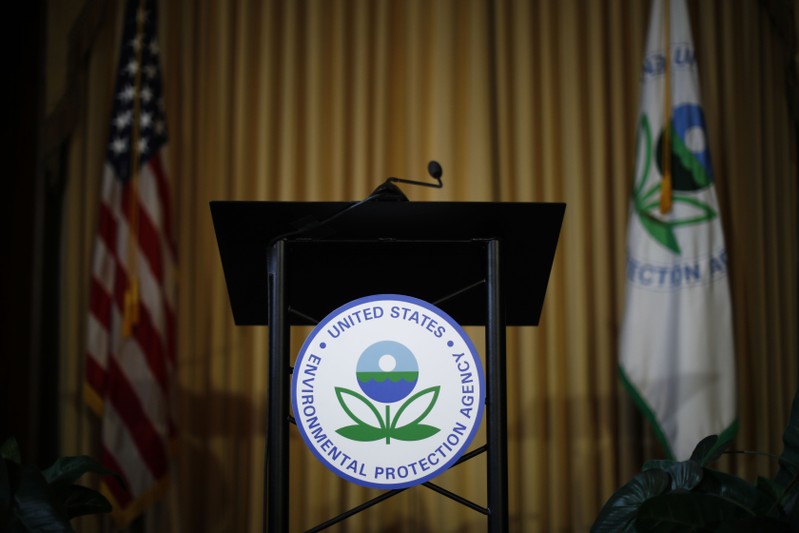
FILE PHOTO – An empty podium awaits the arrival of U.S. Environmental Protection Agency (EPA) Acting Administrator Andrew Wheeler to address staff at EPA headquarters in Washington, U.S., July 11, 2018. REUTERS/Ting Shen
November 29, 2018
By Humeyra Pamuk
WASHINGTON (Reuters) – The U.S. Environmental Protection Agency lifted its annual blending mandate for advanced biofuels by 15 percent for 2019, while keeping steady the requirement for conventional biofuels like corn-based ethanol, according to an agency document seen by Reuters on Thursday.
The mandate includes 4.92 billion gallons for advanced biofuels that can be made from plant and animal waste, an increase from the EPA’s initial proposal in June of 4.88 billion and above the 4.29 billion that had been set for 2018, according to the document.
The requirement for conventional biofuels remains at 15 billion gallons for 2019, on par with 2018 and the same as proposed by the agency in June.
The EPA is required to announce formally the biofuel mandate figures, which are closely watched by the rival corn and oil industries, by Friday.
Biodiesel blending credits rose 4 cents to trade at 46 cents on the report, before paring gains, two traders said.
Under the U.S. Renewable Fuel Standard, first adopted in 2005, oil refiners are required to blend a certain amount of biofuels, as determined by the EPA, into their fuel each year or purchase blending credits from those that do.
The policy has helped farmers by creating a huge market for ethanol and other biofuels, but oil refiners say compliance can cost a fortune.
The new figures confirm the agency has declined requests by the corn industry to reallocate biofuel blending obligations previously waived under the small refinery exemptions program, which has been expanded dramatically under the administration of President Donald Trump.
Small refineries can be exempted from the RFS if they prove that complying would cause them financial strain.
The powerful corn lobby and top officials in the U.S. Department of Agriculture have complained for months that the expansion of the waiver program since Trump took office threatens demand for ethanol.
An EPA official told Reuters earlier this week that the decision not to reallocate waived volumes was due mainly to timing.
“The primary reason why we’re not reallocating in this rule is because we have no idea what the volume of SREs (Small Refinery Exemptions) will be for calendar 2019 and we won’t know that late 2019, early 2020,” the official said.
“ABUSIVE WAIVERS”
The Trump administration has also temporarily put on hold processing of current waiver applications as the EPA and the Department of Energy review the scoring system used to evaluate them, sources familiar with the matter told Reuters.
The EPA is still expected to rule on current applications before the March 31 compliance deadline for the 2018 calendar year.
In an interview with Reuters, Bill Wehrum, assistant administrator at the EPA’s Air and Radiation Department, said most applications have not yet been received.
“For calendar year 2018, I think we are only now starting to get applications, and the bulk of them we are not going to see until probably early next year,” he said, but declined to comment on any expected change in the number of waivers granted.
“I am not going to predict what we may or may not do,” he said. “Each waiver decision is based on an individual application filed by an affected entity.”
Biofuels industry participants repeated calls on the EPA to not grant too many waivers.
“Without a check on abusive EPA waivers, we’ll continue to see plants closing their doors or idling production,” Brooke Coleman, executive director at the Advanced Biofuels Business Council, said.
Trump has sought to please the corn lobby with a different tweak to U.S. biofuel policy: In October he directed the EPA to draft a rule allowing year-round sales of higher ethanol gasoline blends called E15 – a product restricted during the summer over concerns it contributes to smog.
Wehrum said the agency was on track to finalize the rule before June 1, in time for the 2019 driving season.
“We will get it done by then,” he said. “I think there’s a virtual certainty that we’re going to get challenged in court. I think we gave a good legal argument.”
(Reporting by Humeyra Pamuk; Additional reporting by Jarrett Renshaw in New York, Editing by David Gregorio, Richard Valdmanis and Leslie Adler)

